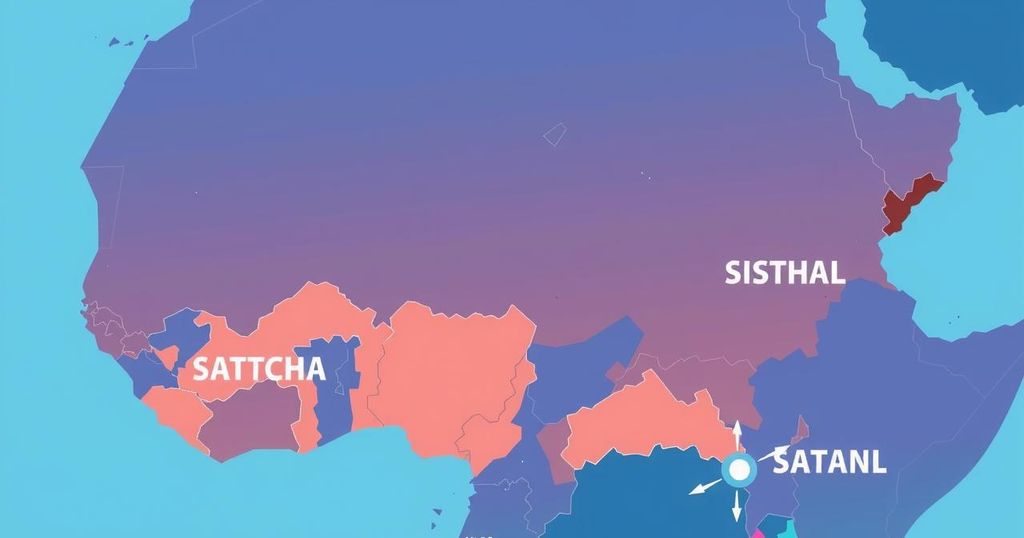Global news
AE, AES, AFP, AFRICA, ALLIANCE OF, ALLIANCE OF JUNTA - LED SAHEL STATES, ASIA, BURKINA FASO, CHINA, COUP, DJ, DJABAKATE, EUROPE, EUROPE/ASIA, FRANCE, GHANA, INTERNATIONAL RELATIONS, MAD, MADI DJABAKATE, MALI, MILITARY COUP, REGIONAL COOPERATION, ROBERT DUSSEY, RUSSIA, TEMA
Leila Ramsay
0 Comments
Togo’s Potential Membership in the Alliance of Sahel States: Strategic Implications
Togo is contemplating joining the Alliance of Sahel States, which includes Mali, Burkina Faso, and Niger. Foreign Minister Robert Dussey emphasized the strategic advantages of port access and regional cooperation. However, this move could complicate Togo’s relationship with ECOWAS and raise concerns regarding governance and political stability.
Togo is exploring membership in the Alliance of Sahel States (AES), which includes Mali, Burkina Faso, and Niger, all led by military juntas. This potential alliance could provide Togo’s landlocked neighbors with critical access to its port. Foreign Minister Robert Dussey expressed optimism about the alliance on social media, stating, “Togo is considering joining the AES, a strategic decision that could strengthen regional cooperation and offer access to the sea to member countries.”
Access to a port is crucial for the three landlocked nations facing jihadist threats, as they seek to reduce dependency on Ivory Coast and Benin. Leaders in these countries have started utilizing Togo’s port in Lome and Ghana’s Tema port, considering Togo’s projected membership as a catalyst for enhanced trade and cooperation. Political analyst Madi Djabakate noted the potential benefits of economic solidarity and improved military collaboration, stating, “There’s the hope of economic solidarity: access to Nigerien oil, renewed trade routes.”
Jihadist activities have surged in northern Togo along the Burkina border, prompting AES leaders to strive for improved control and security since their coup d’états from 2020 to 2023. This regional unity and defiance against Western influence align with Togo’s historical governance under President Faure Gnassingbe. Djabakate remarked, “By engaging with the AES, Togo is part of a pan-African narrative where nations, long divided, are learning to stand together.”
However, Togo’s approach could be seen as a diversion from internal opposition and criticisms regarding a controversial new constitution designed to extend Gnassingbe’s rule. Sociologist Francis Akindes pointed out the political similarities between Togo and AES nations regarding maintaining power structures.
Opposition leader Nathaniel Olympio warned that AES membership might alleviate Togo from ECOWAS’s regulatory standards regarding democracy and civic rights. Historically, Togo has fostered positive relationships with military regimes, positioning itself as a mediator within West African politics. Djabakate highlighted the possibility of Togo balancing relations with both ECOWAS and AES, emphasizing, “Alliances aren’t marriages, but rather partnerships.”
Nonetheless, concerns linger over the implications of Togo’s shift towards the AES, with Seidik Abba suggesting that such a move could accelerate ECOWAS’s disintegration, complicating the regional political landscape. Financial and political stability remains precarious for Togo as it navigates these evolving alliances.
Togo’s consideration of joining the Alliance of Sahel States reflects its strategic desire for enhanced regional cooperation and trade opportunities while addressing security concerns related to jihadist activities. This potential alliance may provide economic partnerships and military collaboration for Togo and its neighbors. However, the implications for Togo’s relationship with ECOWAS and domestic political stability raise important questions about governance and the future of regional solidarity.
Original Source: thedefensepost.com




Post Comment